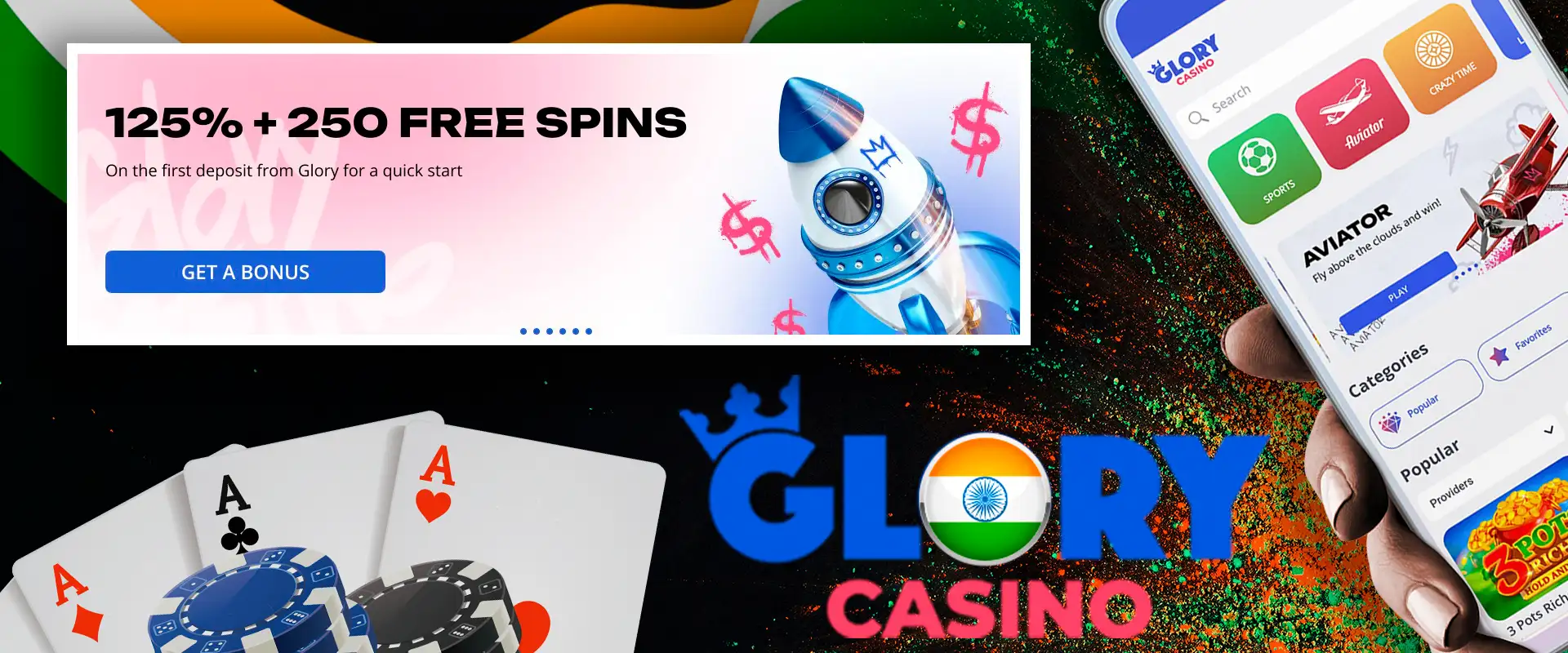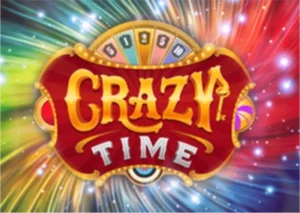Glory Casino: Your Gateway to Online Gaming in India

Glory Casino India is a platform where you can find over 2,000 casino games, virtual sports betting, regular tournaments, and more. Sign up now and claim the 125% bonus of up to 23,000 INR + 250 free spins!
How to Create Your Glory Casino Account

Start betting and enjoying the thrill of gambling with a Glory Casino profile. Sign up in three simple steps:
- Go to the site. Open the site and look at the upper menu to find the button.
- Fill out the data. Fill out the Glory Casino online registration form with your email and password. Select INR as your currency.
- Finish registration. Check the boxes to give final permissions, and tap the button to finish the process.
Note that this is yet not an account verification. A little later, you will be faced with the need to send a photo of your ID for KYC verification.
Bonuses and Promotions for Indian Players

Of course, newcomers come primarily for the welcome bonus. But besides this bonus, the Casino has something to offer.
Welcome Bonus
Newcomers who create a Glory Casino account can claim the welcome offer: a 125% match bonus up to 23,000 INR and 250 free spins. Either way, you can get one of two options:
- Claim a 100% Match bonus. To do this, you simply register and make a deposit at a time convenient to you. With a minimum amount of 300 INR, of course.
- Claim a 125% Match bonus. To do this, you will need the same deposit, but you must make it within an hour after registration.
The wagering requirements are x50. You have 48 hours to do it. Note that the promo can be wagered only in Slots. Also, you can get an additional 250 free spins if your deposit is more than 1,200 INR.
Ongoing Promotions
After using the welcome deal, you get access to other promos, including Reload bonuses and Cashback offers. Currently, there are three tournaments you can take part in:
- Mystery Drop. With a prize pool of 2,000,000 EUR (181,930,000 INR) divided into 10,000 Mystery boxes. There will be 5 winning places among players who bet at selected games.
- The Midas Challenge. This tournament offers a 1,500 EUR (136,447 INR) prize pool, which will be divided among 50 participants who have the most spins at selected games.
- Non Stop Drop. This tournament offers a 1,400,000 EUR (127,351,000 INR) prize pool for players who participate in games like Thunder Coins, Lion Gems and others. There will be 10 prize places for players with the most number of spins.
Other possible promotions at Casino Glory include one-time bonus codes. Be sure to follow the casino’s social media and check your email for exclusive promo codes.
Explore the Games at Glory Casino

Players in India get access to a collection of over 2,000 Glory Casino games, including slots, table games, and other cool releases from more than 100 developers. To guarantee fair play Casino cooperates with independent auditors like eCOGRA.
Slots
The Glory online casino features a wide variety of exciting slots. The collection includes hits like Starburst XXXTreme and Book of Dead, which are known for their adventurous gameplay and big-win potential.
Many players are interested in slots with progressive jackpots. Moree Glory Casino invites you to explore a large selection of Jackpot games, such as Dreamshock Jackpot X or Jackpot 6000.
Aviator Game at Glory Casino
- Provider: Spribe
- RTP: 97%
- Volatility: Low-medium
- Betting range: 10 INR – 10,000 INR
Aviator is the crown jewel of the Glory Casino online game library! Simple, fast-paced, and with the thrill of good betting odds potential, it is all about timing and keeping your cool. No fancy reels or confusing combos, just pure, heart-pounding excitement.
Be quick and cash out the bet before the round ends. You can first check out the gameplay free bets in demo mode. The game offers unique features like auto and double betting and a live chat where you can speak with other players.
Table Games
Glory Casino IN will surprise you with its selection of table games! Try pearls like Andar Nights, Dragon Tiger or Pontoon, which make the Glory Casino game collection exclusive and tempting for players of all different preferences.
Live Casino
The Glory Casino live section lets you enjoy in-play betting with real dealers. At Glory Live Casino, players will find over 450 live betting games in dozens of languages and variations. Including options like Knockout Baccarat, Lightning Sic Bo, and Hindi Roulette.
Crazy Time Game at Glory Casino
- Provider: Evolution Gaming
- RTP: 95.5%
- Volatility: Adjusted
- Betting range: 10 INR – 10,000 INR
Glory Casino Crazy Time is an exciting live dealer game that’s rapidly gaining popularity in India. It resembles a classic wheel game with a main game and four potential bonus rounds. The rules of the game are quite simple, you will need to choose one of the numbers in the game and place a bet on them. Each number has a different potential of winning.
Secure and Licensed: Why You Can Trust Glory Casino

Is Glory Casino real or fake? The platform is legit, which can be confirmed by a license №365/JAZ. The regulatory body responsible for the license compliance of the Glory Casino online casino is located in Curacao.
You can be sure that the protection methods, such as SSL encryption, have already been implemented at the casino. It also cares about users in other ways, such as ensuring access to Responsible gambling tools and links.
How to Place a Bet at Glory Casino

To start playing at More Glory Casino, you need to take a few steps:
- Go to your account. Log into your account using your email and password.
- Cash in. Head to the Glory Casino deposit section, select a payment option, and cash in from 300 to 50,000 INR.
- Find a game. Surf the casino’s game collection to choose a game to your liking.
- Place a bet. Adjust the bet size and its type (if available). Then, click the “Play” button.
You can learn more about the game process at the Glory Casino Help center.
Mobile App for Android and iOS

To get access to all 2000+ games at Glory Casino India, you don’t even need to go through the app download. All you have to do is visit the site in a mobile browser. For your comfort, you can create shortcuts.
To create a shortcut for the Android phone, you need to:
- Visit the site. Open the online Glory Casino website in Chrome.
- Tap Share. Right to the address bar is a Share button you need to tap.
- Tap Add to Homescreen. Tap the “Add to Homescreen” button and add a new name to the shortcut if you want.
For a shortcut for the iOS:
- Visit the site. Open the Casinos’ site in Safari browser.
- Tap Share. The Safari browser has a Share button in the form of a square. Tap on it.
- Tap Add to Homescreen. Find the “Add to Home Screen” option and tap on it.
- Add to your Home screen. Tap the “Add” button after adjusting the name of the shortcut if you wish.
Playing at Glory Casino India from a mobile phone will not affect the choice of games, their quality or download speed.
Deposit and Withdrawal

The best thing for Indian players is that they can choose INR as their currency. Instead of deposit methods like cryptocurrency or bank cards, players can use local e-wallets: UPI and PhonePe. Your deposit cannot be less than 300 INR. As for the maximum, it is limited to 50,000 INR.
The payment processing at Glory Casino is almost instant. However, it may be delayed or even not go through due to the payment provider. You can always ping support for any Glory Casino deposit problem.
How to Withdraw Money Quickly from Glory Casino
The Glory Casino withdrawal process is quick and simple. To withdraw your winnings, you can use IMPS with limits set from 1,000 INR to 50,000 INR. To do so:
- Click on the Wallet. Click on the Wallet icon. In the form, choose the Withdraw option.
- Click the IMPS icon. Press the IMPS icon and fill in the sum, account number, your name and the IFS code.
- Press Withdraw. Press on the Withdraw button to confirm the transaction.
As for the withdrawal limits, you won’t be able to withdraw funds if your bets combined are less than the sum you’ve deposited. The сasino offers withdrawals in 48-72 hours.
Customer Support

The Glory Casino support team will answer you at any time. Use these options:
- Email support. The address support@glory.bet is at the site’s footer. Choose this method if you have a large complaint for the Glory Casino customer service or comments on the casino’s work.
- Glory Casino live chat. Press the button with a chat icon on it and wait for the manager.
You don’t need phone support, as you can find most of the answers in the Terms and Conditions. It is the main source of knowledge about how to play Glory Casino, the rules and obligations towards you and vice versa. Instead of the Glory Casino customer care number, you can use email or live chat to contact support.
Conclusion
Every fan of online gambling will find something for themselves at Glory Casino: daily rewards for those who seek bonuses, mobile gaming for those who are always outdoors, and high-stakes games for High rollers. Glory Casino offers a massive 2,000+ game collection, live casino, and Vsports betting with great event coverage. Is Glory Casino legit? Yes. The platform has a Curacao license that guarantees fairness and data security.
FAQ
Yes. The Glory Casino website has a license and implements all needed security protocols. Glory Casino reviews confirm that players are happy to continue playing at the Casino for a long time.
PhonePe and UPI are accepted as payment methods for deposits. Players can use rupees without any problem. For withdrawals, you will need to use IMPS.
Yes, you can get up to 125% on your first deposit.
Yes, you can run the Casino on any mobile device as long as it is new enough. The image and graphics quality will not be affected.
Glory Casino withdrawal time is set to be around 72 hours. By the way, it can depend on your Casino status.










